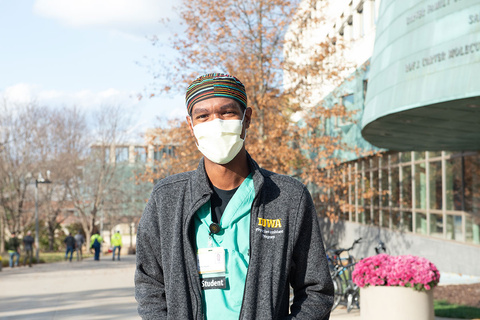
Program: Physician Assistant
Be flexible and adaptable.
As Terry Hayes approaches his final months in the Carver College of Medicine Department of Physician Assistant Studies and Services, he shares his biggest takeaways from an unprecedented year in health care.
What are your plans after graduating?
I’m still trying to figure that out right now. The PA program helps you a lot with the job search by giving you all the tools necessary to find a job where you want to go. I have a few options, and I’d like to stay here. I really like the university and being at the hospital.
Surgery is my preferred specialty. I’m not sure which area of surgery, I just like the idea of being in the operating room and the variety of patients and procedures that surgery has to offer.
You’ve had the unique experience of training during the COVID-19 pandemic. What has this year taught you?
The biggest takeaway is to be adaptable because things have changed at the drop of a hat. If you’re not ready to roll with the punches it can be very unsettling and cause a lot of anxiety.
My experience has been very unique. It’s been unprecedented. We were pulled off rotations for 10 weeks while the university tried to figure out the best way to keep us safe on rotations. I think a lot of it also had to do with PPE [personal protective equipment] shortages at the time. With all things considered, I think our program did a good job of accommodating our clinical schedule while still allowing us to graduate on time. It was a balancing act, but we completed the clinical experiences we needed to be confident to go out and practice and pass board exams.
Given that the PA program is ranked at the top nationally, what are the strengths of the program?
One of the main strengths is the people. The faculty does a great job of supporting you and all your needs. They set you up to use all your strengths to be successful in the program. That was a huge draw for me. It really felt like a family when I came here. I could go to the faculty at any point in time if I ever needed anything.
Additionally, the curriculum and being in classes with the medical students is a huge draw. Learning the same things, from a didactic perspective, and being able to take that out into the clinical world is a big advantage. I think it also helps build relationships with our physician colleagues because we’re already exposed to working with them. They know who we are, they know what we’re capable of, what our education is, and vice versa.
Also, by being in an established program, there are great clinical learning opportunities set up all over the state and country. The PA faculty want us to get a diverse experience and have the best understanding of treating different patient populations. We get rural medicine and urban medicine exposure, while learning to help different socioeconomic populations that we are also going to be treating in the future.
Was there anyone in the program that was especially helpful in mentoring you?
Justin Sipla, PhD, our neuroanatomy professor. He taught me how to be what I like to call continually curious. That even when we think that we have found an answer, we can always go a step further. Our mind is a map with infinite areas to explore and there are always areas that we can unlock. Pushing ourselves and making those neural connections, to truly understand something, is what will allow us to be better clinicians for patients.
What advice would you give to incoming physician assistant students?
Be flexible and adaptable. Even beyond being a student, that’s what your career is going to require. You’re going to need to adapt to many patient situations or work situations. PAs, in general, are trained to do just that. With the education we receive, we get a strong foundation to fit where we’re needed.
Also, enjoy the process. Don’t lose the forest for the trees, so-to-speak. It’s easy to get caught up in the moment, especially when we are struggling with something. But don’t be too hard on yourself and always remember your ‘why’. Coming into a program like this you may not always be 100% successful at everything. Know when to seek help and how to take care of yourself and your mental health, especially in today’s age where there’s so much pressure on health care professionals.
What was the most rewarding part of your Carver College of Medicine experience?
Definitely being around my class. We have the advantage of being integrated with the larger medical student group, while also having our smaller class within that. It prevents you from the feeling of getting lost in the crowd. It also allows for the development of great friendships. I was fortunate enough to spend the last 28 months with 24 amazing individuals who I now have as lifelong friends and colleagues.
Commencement 2020
The UI Carver College of Medicine will host a commencement ceremony for the Physician Assistant Program Class of 2020 at 2 p.m. Friday, Dec. 4. In accordance with the university and its commitment to mitigating the risk to public health regarding the COVID-19 situation, the ceremony has been moved to a virtual ceremony. Family and friends will be invited to view the ceremony virtually.
Share your photos and memories using #UIowaGrad20